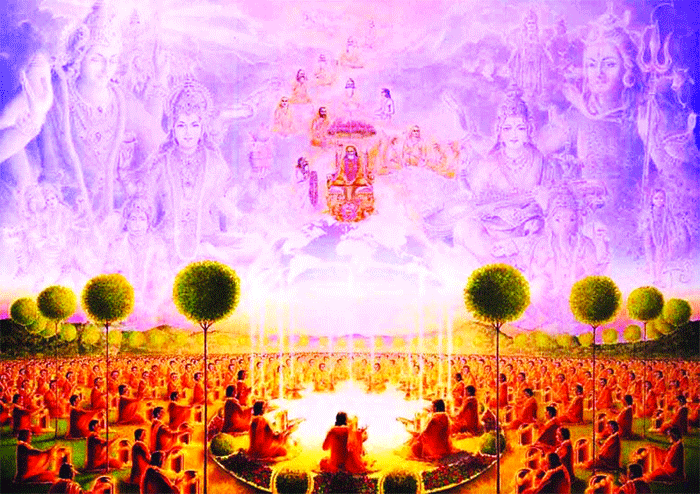Yajna has various meanings; it means God, primordial matter, cosmic forces and interactions, and all coordinated social acts, writes Daksha Bharadwaj
It is impossible to truly translate the Vedic term yajna in any language as it is quite technical. Many times, a Vedic term seems to mean an object, but actually, in Veda, it means a certain system or phenomena. And the Vedic term, yajna, is one of them. It has a complex meaning.
Modern orthodox scholars translate yajna as ‘sacrifice’, more so do the Westerners. Many indigenous scholars express it as a ritual in which fire is made and in which various oblations are offered, while hymns are recited in the praise of some Gods or deities to please them or to appease them. The offerings may be some useful medicinal herbs and many aromatic materials, or it could be animal offerings.
We can understand why the Western scholars would translate yajna of Veda as sacrifice because it was performed on a ‘Vedi’, which is a raised platform like the altar on which sacrifices were offered in the West.
Further, Judaism, Christianity and Islam devoutly believe that sacrificial test as a sign of total faith was an essential feature for revelation of God to his chosen person. Relative study of religions shows that their sacrifice and other features are closely paralled to those of many Pagan nations.
The Westerners, biased by such a background, could not help but look in Vedic hymns some references which would sound as sacrifice to please their Gods.
In Veda, the term yajna is found to have different meanings in different fields. It means God, primordial matter, various cosmic forces and interactions, and all coordinated social blissful acts. We now put forward the real Vedic concept of yajna.
Great Vedic etymologist Yaaska once said: “Yajna ajna kasmaat.” (Nirukta, Vol. 2, Devaat Khand, Adhyay-7, Paad-1, Khand-6) “What is meant by the term yajna.” The word yajna is derived from the root yaja, which consists of three phrases:
· Yaja: Dhatu Path Bhawadiga.
· Yaja Deva Pooja: Devotional service between the host and workers. In physical fields, strong affinity and compatibility between the particles.
· Sangati karan: Union, synthesis and compounding and working together.
· Daana: To produce and contribute a beneficial product or effect.
These three together complete the system of yajna. Yajur Veda, the Veda of yajnas, qualifies it in its opening hymn: “Sthatamaaya karmana.” (“Yajna is the noblest, most beneficial deed, done for greatest good, to the greatest number of people.”)
All collective, coordinated, beneficial efforts come under this term. It is not a single person’s effort; it is a collective work. It can be on small or cosmic scales. On the smallest scale, a yajna is a daily obligation of each family to purify the atmosphere of the house and the surroundings by making fire and offering medicated, aromatic herbs for proper fumigation. Fumigation is the best method of disinfection recognised even today. This deed is done by the family members collectively. It is not essential in yajna to always make fire and put oblations. Yajna has a wide application such as:
GOMEDHA YAJNA
It is meant to improve cultivation, agriculture, and husbandry. “Gow” means the moving earth, land and soil. It also means cow and domestic animals like ox, horse, camel, buffalo, mule etc that can pull the ploughs. Today, a tractor is also a ‘gow’ because anything that moves or makes others move is called a ‘gow’.
So, Gomedha covers all research in improving cultivation, in the soil chemistry, seed research etc. to improve the quality and quantity of foods, not only improvement of cereals but also of all edibles, vegetables, and fruits as such fire-making ritual is not needed. It also covers all branches of husbandry and how to improve breeds of the cattle, their race, life and health.
‘Gow’ is etymologically “Gachchhati yo, yayaa vaa.” (“That what moves or by what other things move is gow”) Medha means Aashugrahane Dhatupath Kawvaadigan or to quickly beget.
SHIlPA YAJNA
Shilpa Yajna also covers all industries under the category of shilpa. Various scientists and technicians of are made to jointly and devotedly work to develop light and heavy industry.
The word “Vishvedevaa”, performing various yajnas, mean various specialists and experts giving expertise and working in various fields of technology and industries, in big laboratories and factories. All such collective working in various machines and factories is known as Shilpa Yajna.
ASHVAMEDHA YAJNA
At times, when we need to raise manpower, for wars or at the time of calamities, Ashvamedha Yajna is performed. Ashva means a horse, which is a symbol of power, as horsepower. Ashve-Medha, therefore, is collecting or raising the manpower for the state.
People have a misconception that only a fire ritual is a yajna. The various facts mentioned above do not mean that by just performing the fire ritual and recitation of Vedic hymns shall be enough to accomplish all that we have mentioned above. Orthodox people have wrongly confined yajna to the fire-receptacle (kunda) only. Yajna has vast fields and need experts, working collectively to develop and advance the country’s civilisation and culture.
Bharadwaj is a spiritual writer. studio.bba2011@gmail.com

























